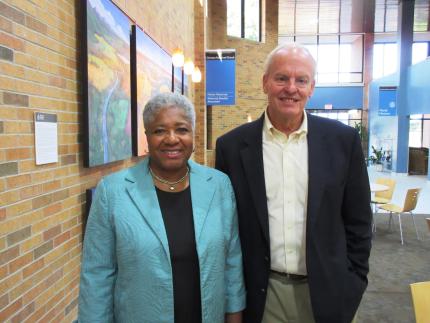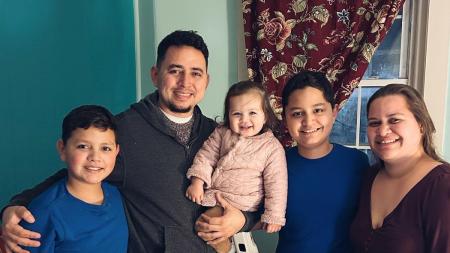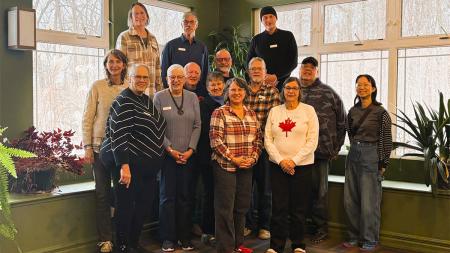Reformed Leadership Initiative Is Launched

Denise Posie and Ken Eriks
Chris Meehan
The Christian Reformed Church in North America and the Reformed Church in America have launched a new, two-year pilot project to develop leadership in congregations in selected areas across North America.
Joining the denominations in what is called the Reformed Leadership Initiative (RLI) are Calvin Theological Seminary and Western Theological Seminary.
This effort is a result of the continuing work of the Reformed Collaborative, an ongoing partnership in which the CRC and RCA are working together in a number of areas, including in the Church Multiplication Initiative in which the denominations are planting churches together.
In addition, the RLI arises out of the Joint Resolution — calling on the churches to work together wherever possible — adopted by the CRC Synod and the RCA General Synod in 2014 during simultaneous meetings held in Pella, Iowa.
“In this new initiative, we are specifically living out the joint 2014 resolution of the synods to learn and work together in a number of ways,” says Ken Eriks, director of transformational engagement for the RCA and co-director of the RLI.
“We think it is important for churches in our denominations to think intentionally about leadership development and to help lead churches in mission in today’s world.”
Colin Watson, the CRC's director of ministries and administration, says that this initiative is based on the command of Jesus to go and make disciples and that "by his life, and those he inspired, he showed us how leadership development is about the 'how' of being more effective in ministry."
"Given that leadership skills are often caught, as well as taught," says Watson, "working with the RCA in this Reformed Leadership Initiative gives us a unique opportunity to collaborate, share successes and failures, in a variety of local and diverse contexts."
The RLI, funded by the Richard and Helen DeVos Foundation, will serve as a first “step in developing a diverse, distributed network for leadership training,” said Denise Posie, a congregational consultant for the CRC and co-director of the initiative.
To begin, RLI will create and support six Leadership Learning Networks in diverse contexts and geographical regions in North America.
“We are currently determining where these will be,” said Posie.
In these networks, she said, between eight to 10 CRC and RCA churches will meet together under the direction of a team of local co-leaders who will be assisted by denominational staff members from each denomination. The network could begin meeting as early as the first of the year.
“The purpose of these networks will be to create space for congregations participating in the cohorts to learn from, and with one another, to share tools and models for leadership development,” Posie said.
While four of the networks will focus on churches in various geographic locations, there will be one in California specifically for Hispanic churches from across North America.
Similarly, there will be one in the New York City area for Korean churches from across North America.
Eriks said in this initiative, churches will have the chance to take the time to consciously evaluate leadership for their members and then seek to find ways to provide the skills necessary for them to be better leaders.
“We go into this knowing we don’t know what churches need and what they should do,” he said.
“We see this initiative as providing them an opportunity to decide who they want to help and how they want to do ministry. We’ll be there as a resource to help them through the process.”
Given this approach, there is a great kingdom value to the initiative, said Posie.
“This initiative will give churches the chance to impact spiritual growth. They will be able to look inside themselves and to consider what skills they need in order to do ministry in the context in which they find themselves.”
In addition, the initiative will give CRC and RCA congregations a chance to get to know one another better, to share best practices, and to build relationships for them to join in ministry together in their locations in the future.
“These leaders will share experiences and tools together. There will be peer learning,” she said. “At the denominational level, we will benefit as well, given that we’ll have a chance to learn what things are most important to churches as they do their ministry.”
As part of the RLI, every congregation in one of the networks will select a team that will take responsibility to “create and implement leadership development processes that are appropriate to the size, situation, and context of their congregation,” says Posie.


